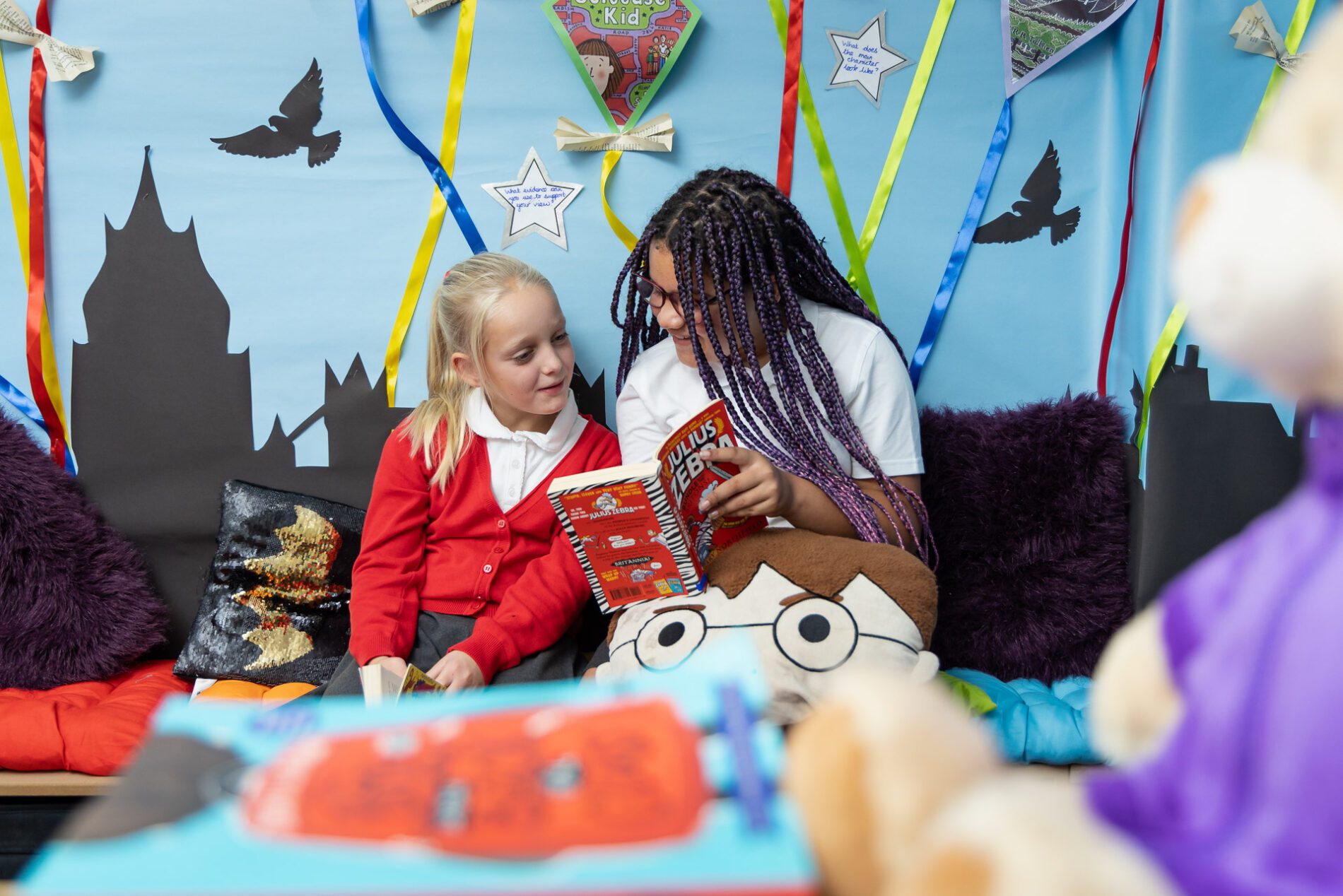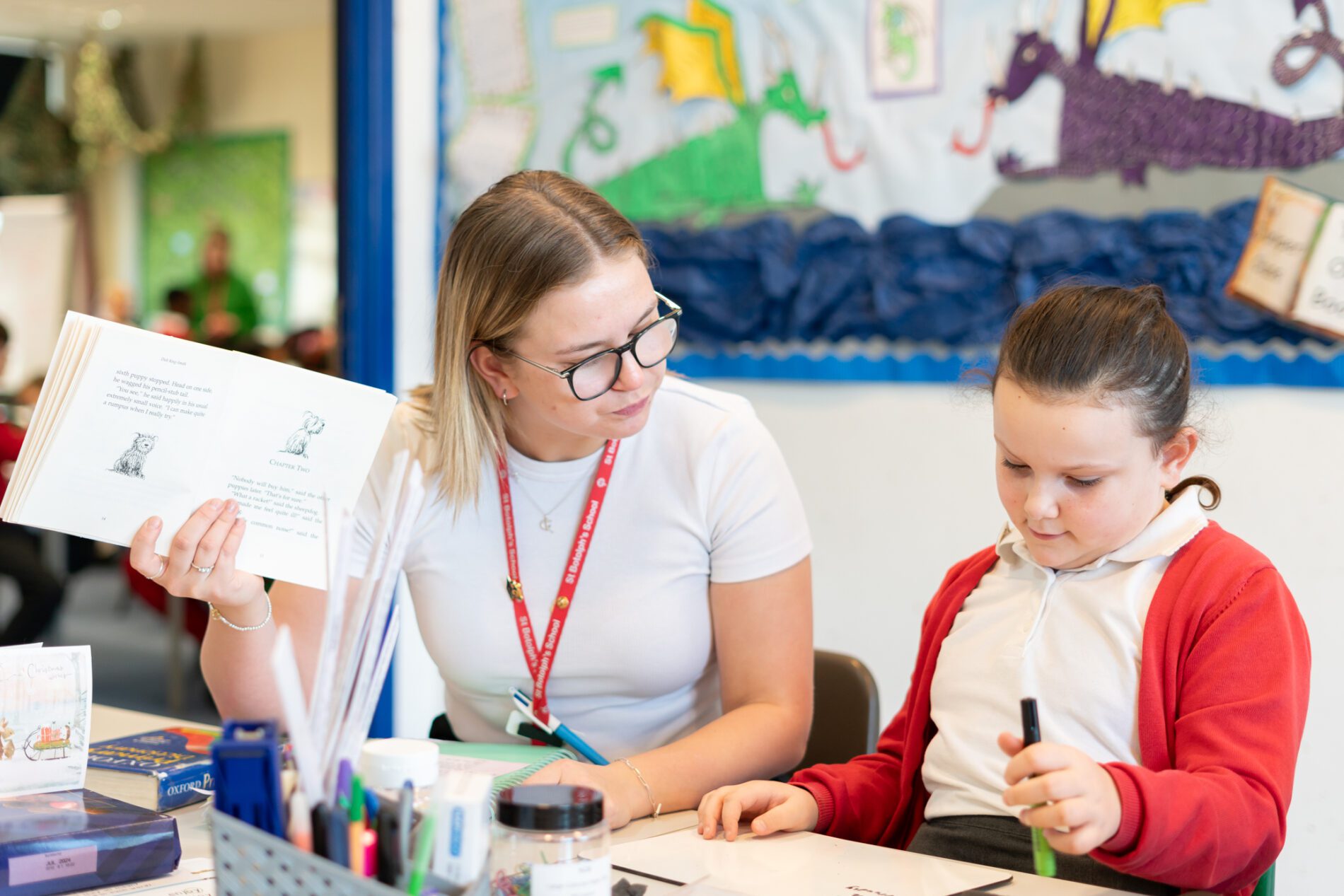English Reading Subject Leader: Mrs L Pollard
For any more information on St Botolph’s English Reading Curriculum, please contact the office.
Intent
We acknowledge the importance of English skills in enabling our pupils to access all areas of the curriculum and the wider world. Through the high-quality teaching of English, pupils are encouraged to develop spiritually, culturally, emotionally, intellectually, and socially. Our curriculum enables pupils to acquire knowledge; building on what they already know, deepening skills and understanding and fostering inquisitive analytical minds.
We equip children with a strong command of the spoken and written word, providing access to a wide range of texts; enabling us to promote high standards of language and literacy, whilst developing and nurturing their love of literature. We acknowledge that great readers become outstanding writers and our curriculum is planned with this at the forefront.


Implementation
The understanding of the power of language, in both its written and spoken form, is an integral part of our English lessons through our use of the Read into Writing programme, EdShed Spellings, Sir Linkalot and Accelerated Reader. The progression of skills for writing, reading, and speaking and listening, are developed through the year groups, with grammar, punctuation, and spelling skills of key importance within all lessons. Key texts and outcomes are chosen carefully to engage and develop critical thought, response and enjoyment. Pupils listen, read, write, speak, role-play, question, analyse, edit, and improve, to gain the essential English skills required to progress. Sequences of lessons develop and embed knowledge and skills, building on previous learning. There is also the opportunity to regularly review, evaluate and recap understanding and address misconceptions. All children have the appropriate level of support and challenge.
Teachers monitor learning and skills, identifying errors and misconceptions, exploring language, plots and characters further, and providing direct feedback. Children are taught to become free thinkers, accomplished writers and confident speakers.
Lessons are well-resourced and teachers deliver high-quality teaching and learning opportunities which are monitored closely by the leadership team.
Our curriculum lends itself to active learning; we take every opportunity to enhance learning and enjoyment in English. To support the well-structured and progressive curriculum, we constantly celebrate the diversity and power of language. Through different avenues (author visits, storytelling events, World Book Day, book fairs, shared reading activities, forest school), children explore their acquisition and understanding of language, thus developing their speaking and listening skills which are essential to becoming an accomplished reader and writer.
Impact
English at St Botolph’s is fun, engaging, and of high quality, providing children with the foundations for communicating effectively with the world around them. By the end of the curriculum, pupils have the tools to read with clarity and express themselves clearly. Pupils feel confident in their reading skills; they are excited about literature, show that they are actively curious to question more and see the importance and relevance of their English skills and knowledge as they build their futures.
Progress is measured through a child’s ability to read, write, speak and spell with greater perception and accuracy, detail and purpose. The focus on vocabulary ensures all children can visualise and respond to texts with confidence. Evidence of English skills and learning are recorded in pupil’s books and moderated throughout the year. Moderation provides valuable opportunities for teachers to ensure expectations and outcomes are maintained at a consistently high level. Leaders monitor the quality and impact of the English curriculum through lesson observations, book looks and regular pupil voice to ascertain the extent to which pupils’ skills and knowledge are improving.
Whole-school and parental engagement is maintained through events such as World Book Day, annual storytelling festival, non-fiction November, author visits, book fairs and author-specific home learning tasks, alongside promoting the importance of reading at home.
The impact of our English curriculum is seen across the school, as our children develop the skills to access the rest of the curriculum successfully. Further evidence of this impact can be seen when our pupils leave us equipped with the literacy skills and knowledge required for the Key Stage 3 curriculum, and for life as an adult.

Accelerated Reader
At St. Botolph’s, the children from Year Two upwards follow Accelerated Reader. Class teachers will decide when it is appropriate for the children to start using Accelerated Reader. A child needs to have some fluency in their reading as this programme does not help children learn to read – it consolidates their learning and promotes reading comprehension rather than decoding and word reading skills.
Accelerated Reader is a computer program that helps teachers manage and monitor children’s independent reading practice. Children, with the support of their class teacher, pick a book at their own level and read it at their own pace. When finished, the children take a short quiz on the computer or iPad. (Passing the quiz is an indication that the child understood what was read).
If a child does not do well on the quiz, the teacher may help them choose another book that is more appropriate or ask more probing questions as they read, and before they take their next quiz. In most cases, children really enjoy taking the quizzes. Since they’re reading books at their reading and interest levels, they are likely to be successful. This is satisfying for most children. Best of all, they learn and grow at their own pace.
English Reading in Each Stage
Systematic phonics is taught using the Little Wandle Revised Letters and Sounds scheme. Pupils are taught their sounds through daily sessions, learning how to segment and blend their sounds. Children are immersed in a wide range of stories, rhymes and poems. As well as reading books linked to the sounds they are learning, they are also encouraged to read another book of their choice, promoting the love of reading. They are encouraged to express their ideas, emotions and imagination after experiencing these rich and diverse texts. We regularly run workshops to inform parents of our teaching and expectations, encouraging them to support their children.
For more recommended reading, please visit the EYFS Class page
English Reading Progression
SEND Information
Pupils are regularly monitored and assessed, with the more able readers challenged and those who require more support attending individual or group interventions. These are led by class teachers and support staff. Children with more specific needs may have personalised programmes, which are regularly shared with parents and carers. We also use a reading intervention programme; Building Reading Stamina (BRS) to support pupils not reading at the expected level to ensure they make accelerated progress.
Home Learning
The decodable reading practice book is taken home to ensure success is shared with the family. Reading for pleasure books also go home for parents to share and read to children. At Stone St Mary’s, we use the Little Wandle Letters and Sounds Revised parents’ resources to engage our families and share information about phonics, the benefits of sharing books, how children learn to blend and other aspects of our provision, both online and through workshops.
Children from Reception onwards have a home reading record. The parent/carer records comments to share with the adults in school and the adults will write in this on a regular basis to ensure communication between home and school. As the children progress through school, they are encouraged to write their own comments and keep a list of the books/authors that they have read. Children across the school have regular opportunities to engage with a wide range of Reading for Pleasure events (book fairs, author visits and workshops, national events etc)


